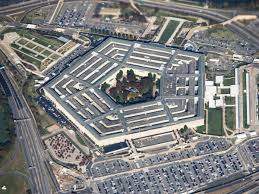Biden’s Pentagon Backs Missile Defense After a $1.2 Billion Flop

The Biden administration is pressing ahead with efforts to develop a successor to a failed missile interceptor project that cost $1.2 billion, awarding an initial contract as soon as this month to two of the three biggest U.S. defense contractors.
The decision to proceed is one of the first procurement decisions under new Defense Secretary Lloyd Austin. The Pentagon’s Missile Defense Agency plans to choose two winners for five-year design and development contracts from teams led by Northrop Grumman Corp., Lockheed Martin Corp. and Boeing Co.
The agency “continues to adhere to established source selection processes as they evaluate each of the proposals and anticipates being ready for contract award this month,” Pentagon spokeswoman Jessica Maxwell said in an email. The Defense Department’s independent cost analysis unit must complete its program estimate before the award, she said.
The competition will culminate with a winner-take-all selection to build as many as 20 new warheads after a “Critical Design Review” scheduled for no later than 2026, a date the agency hopes to accelerate. The new warheads are intended to crash into and destroy incoming missiles from an adversary such as North Korea and Iran. They would be installed on missile interceptors based in Alaska, adding to 44 with earlier model warheads already in place in silos there and in California.
The “Next Generation Interceptor” is intended to correct the mistakes of a failed warhead program that spanned the Obama and Trump administrations before it was canceled in August 2019 after $1.2 billion was spent on a project meant for deployment in 2023.
The Missile Defense Agency and the contractors on that project -- Boeing and the company now known as Raytheon Technologies Corp. -- had multiple opportunities since 2010 to address issues leading to the cancellation, according to the Government Accountability Office in a report last year.
Countering ‘Adventurism’
“The Biden administration can prove it can do missile defense better than the Trump administration” by keeping the program on track, said Tim Morrison, a former Trump administration National Security Council official who’s now an analyst with the Hudson Institute. He said modernizing the ground-based missile defense system would strengthen Biden’s hand against North Korea and Iran and also create “deterrence against the reckless adventurism of Russia and China.”
In the new competition, Boeing has teamed with General Atomics Electromagnetic Systems; Northrop Grumman is working with Raytheon; and Lockheed has teamed with Aeroject Rocketdyne.
The estimated total cost if the earlier “Redesigned Kill Vehicle” had been completed had ballooned to $2.91 billion by the time it was canceled. That was up from an original $870 million estimate in 2015.
According to the GAO, the agency and contractors “did not adequately address technical risks despite numerous warnings from subject matter experts and officials within and outside of the RKV program about the performance issues which later resulted in the program’s cancellation,” the GAO said.
Lessons learned from the failed program are being applied in the new competition with plans for early testing of parts and test flights, the GAO said in confirming the approach announced last year by Vice Admiral Jon Hill, the current director of the Missile Defense Agency.
Hill said last year that he anticipated placing the first of the defensive missiles in the ground “after sufficient intercept testing as early as 2028.”
Photo: Saul Loeb/AFP/Getty Images
Link: Biden’s Pentagon Backs Missile Defense After a $1.2 Billion Flop - Bloomberg




